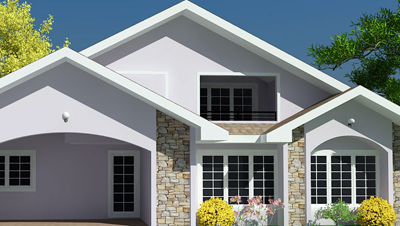Why invest in real Estate in Ghana? Ghana’s growing population, buoyant economy and favourable investment environment make its real estate market increasingly dynamic. In spite of complicated issues over local lending and land ownership, demand for housing spans the entire spectrum of the population, from wealthy Ghanaians and a growing number of expatriates through a rising middle class to lower-income groups.
The roots of the current housing market boom began in the early 1990s, when the financial sector was liberalised, and the sector’s expansion has since gone hand-in-hand with that of the economy as a whole, generally growing steadily although also seeing occasional setbacks and slowdowns during periods of economic turbulence.
It has not, however, gained a great deal of international attention. But now, with Ghana one of the fastest-growing countries in the world – the IMF expects GDP to rise by 7.3% this year, following 13.5% in 2011 – investors and authorities alike are realising the potential – and importance – of the nation’s real estate sector.
Last month, the government sealed an agreement with the Ghana Real Estate Developers Association (GREDA) reaffirming a commitment to encourage the growth of private real estate firms to meet the country’s housing needs, particularly at the lower-end of the market where there has been significant discussion as of late but comparatively limited activity.
Ghana has an encouraging framework for real estate investment, with freely-transferrable capital and profits, but projects have generally concentrated towards the middle and the top of the market, where margins are bigger and demand has remained relatively stable. As a result, a shortage of affordable housing is one of the biggest challenges facing the country, which is otherwise a relatively prosperous and stable part of West Africa. While the gap between supply and demand is most acute at the bottom of the income scale, there is also rising demand in the middle- and high-income segments, in which local and international developers are showing increasing interest.
Speaking at a workshop on housing delivery, Nii Nortey Dua, the deputy minister for water resources, works and housing, reiterated the government’s commitment to reform to encourage private sector property development. Overall, Ghana is estimated to have a shortfall of around 1m units.
“We are willing to partner [with] the private sector to remove all the obstacles facing them so as to improve the socio-economic well-being of the people,” Dua said, adding that investment and public-private collaboration could help the country meet the objectives of the Better Ghana Agenda, the government’s national development programme.
The country did just that with South Korean conglomerate STX Corporation on their plan to build 200,000 housing units worth some $10bn, but after negotiations failed in January, President John Atta Mills announced that the project had fallen through and that he was looking for “alternatives”. The government also recently decided to repossess all assets advanced to STX, including 15 land sites across the country.
Of course, in spite of the renewed push on affordable housing, the rising level of per capita GDP and the growing number of white collar expatriates still draws a number of developers to the higher end of the market, and gated communities are proliferating in the wealthier neighbourhoods of the capital, Accra.
“Initially, middle and high-end homes were patronised largely by non-resident Ghanaians and foreigners, but gradually the middle class in Ghana is growing and local Ghanaians are patronising such homes,” Samuel Ewool, the executive director of Buena Vista Homes, a Ghanaian builder-developer, told OBG. “There has also been a remarkable increase in the number of foreigners from the West African region buying property here as investment because of the political stability in Ghana.”
Kofi Ampong, the CEO of real estate firm Broll Ghana, agreed. “On the residential side of the market, there has been a huge growth in terms of short-term lease of apartments for expatriates,” he said. “Since there are so many companies that are setting up base in Ghana to serve West Africa, there is a lot of demand for housing for people that come and stay for a couple of months.”
However, the sector is still constrained by some fundamental complications that limit the capacity for more robust expansion. One of the most significant drags on residential real estate growth has been the difficulty of obtaining a mortgage. High interest rates – over 20% in many cases – and relatively low disposable incomes make housing purchases difficult even for many middle-income families. Many resort to a traditional model of home building, whereby construction of a home is done in stages as cash becomes available.
Nonetheless, Ampong notes a growing willingness among banks and other lenders to provide home loans, whether through traditional mortgage structures or other forms of periodical payment. This, in turn, drives demand for middle-income housing, which developers are increasingly able to meet.
In fact, the secondary and rental markets have helped further spur increased ownership. Rents for the better properties in Accra have soared in recent years, incentivising home ownership over tenancy, as well as making property an attractive investment for those able to build up a portfolio. These dynamics are also driving an expansion of real estate development outside the city; any trip from the capital into the surrounding area will go past a number of proposed projects. While areas served by existing infrastructure, such as roads and electricity, command high prices, those areas where full-scale development has not yet reached are still relatively affordable.
From a standing start in the early 1990s, Ghana’s real estate industry has grown steadily. The impetus of strong economic growth, unmet demand and the country’s emergence into the global investment spotlight, have led to the momentum that is currently building in the sector. Those projects that are well targeted and reasonably priced can capitalise on one of the region’s most stable and interesting markets.
Source: Oxford Business Group














